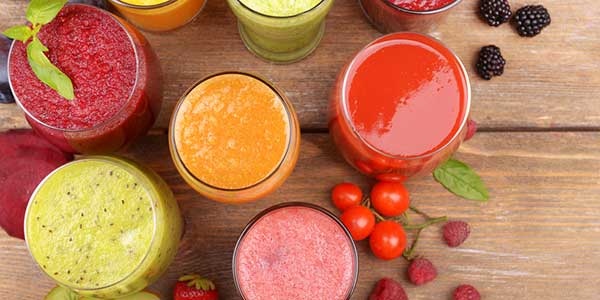
Juice Cleanses and Diets
Juice cleanses and diets generally require sticking to juices mostly pressed from nutritious fruits and vegetables. And unlike most juices found in common grocers, these juices generally lack additives (such as sugar), suggesting them to be pure and loaded with nutrients. Additionally, users seek out juice cleanses to purify the body by removing toxins. Most experts, though, see cleanses as unnecessary considering the body is equipped to cleanse and detoxify itself.
Common Commercial Juices and Cleanses
1. BluePrint Cleanse
BluePrint is self-claimed as the best based on the following characteristics: taste, quality, sustainability, and super service. BluePrint offers a juice cleanse with five levels of intensity and further provides six juice bottles each day, in one, two or three-day increments.
2. Cooler Cleanse
Like BluePrint, Cooler Cleanse also provides six juices per day but in one, three, or five-day increments. And unlike BluePrint, the Cooler Cleanse allows the juice to be sipped with a snack or light meal. Fun fact, Cooler Cleaner was co-founded and promoted by Salma Hayek.
3. Liquiteria
Using the "Norwalk" method, Liquiteria juices claim to offer increased nutrients. Additionally, some of the juices go beyond fruits and vegetables, and contain milks, coffee, and other ingredients. Rather than six juices per day, Liquiteria offers four to eight.
4. Life Juice Cleanse
Life Juice, unlike both BluePrint and Cooler Cleanse, only encourages six juices throughout a three-day span. It also provides an additional "Citrus Sole" bottle, (containing purified water, lemon juice, and Himalayan sea salt) claiming to promote nutrient absorption.
Are Juice Cleanses Good for You?
Health experts will commonly agree such restrictive diets or cleanses should be implemented for only a few days at a time, as the body needs fiber, protein, and fat that are absent in the juice products. Additionally, juice cleanses may cause lack of energy, lightheadedness, an increased sensitivity to cold, a slowed down metabolism and the gastrointestinal tract, and the list continues. All claims aside with nutritional composition in mind, juice cleanses may be safe and effective if short-term.
But before following any sort of diet regimen, consulting with a healthcare professional (such as your primary care doctor or a dietitian) can help answer questions and reduce the risk of potentially harmful consequences. With approval and guidance, drinking pure juices can be valuable to health. Especially when considering the modernized American diet commonly filled with sugar and unhealthful fat, following a juice cleanse may be a push towards healthful habits. It is important to understand dramatic weight loss is unlikely to occur, bearing in mind losing one pound requires a 3,500-calorie deficit each week. Even if weight is lost, it is more than likely attributed to water weight or even the loss of precious muscle mass. And most importantly, juices cannot and should not replace a well-balanced diet that fosters gradual, sustained weight loss.





